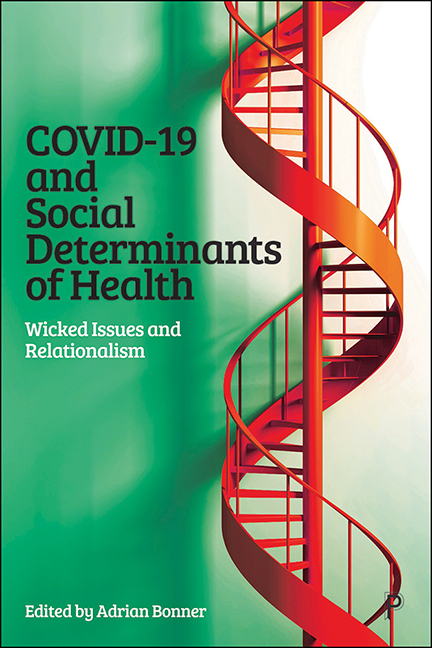Book contents
- Frontmatter
- Miscellaneous Frontmatter
- Contents
- List of figures and tables
- Notes on contributors
- Foreword
- Introduction
- Part I Wicked issues and relationalism
- Part II Regionalism and geopolitical environments
- Part III Public sector, COVID-19 and culture change
- Part IV The third sector
- Part V The case for relationalism
- Part VI Engagement and proposed changes
- Conclusion
- Appendix The Centre for Partnering
- Index
13 - Relational collaboration and innovation in responding to need and austerity: food banks
Published online by Cambridge University Press: 18 January 2024
- Frontmatter
- Miscellaneous Frontmatter
- Contents
- List of figures and tables
- Notes on contributors
- Foreword
- Introduction
- Part I Wicked issues and relationalism
- Part II Regionalism and geopolitical environments
- Part III Public sector, COVID-19 and culture change
- Part IV The third sector
- Part V The case for relationalism
- Part VI Engagement and proposed changes
- Conclusion
- Appendix The Centre for Partnering
- Index
Summary
Introduction
Maslow in a seminal work talked of a hierarchy of needs whereby the most basic needs were physiological. The need for food was placed in the most basic category (Maslow, 1943). The need for some security in the availability of food is rooted in the concept of life itself. The responsibility of government to meet such basic needs is a measure of whether it is fulfilling its essential obligation to citizens (Alaimo, 2005). International aid efforts to respond to famine typically emanate from a failure of government in the country to address this need. In the UK the rapid emergence of food banks was seen by some as a measure of government failure to respond in the face of clear evidence of unmet need (Garthwaite, 2016).
This chapter examines, through the medium of responses to food insecurity, the range of responses in terms of collaboration and innovation. Though the image in the UK is the phenomena of food banks we will take a broader approach and will explore aspects such as technological responses and the growth of social supermarkets and food recycling initiatives. We will draw upon examples in a range of countries and upon concepts of collaboration and partnership which reach beyond the traditional charity model driven by fundraising/grant approaches. Social enterprise and social innovation will be explored together with mechanisms which significantly derive from private sector initiatives. Reference will be made to emerging trends which may impact on food insecurity and the potential implications going forward.
Collaboration and innovation
Collaboration in the context of social welfare has a well established literature (Hudson, 1987). It typically envisages collaboration between organisational entities (such as between state agencies and the private and third sector). The UK policy agenda on linking health and social care is a reprise of a long established discourse (Leathard, 1994). The language of ‘partnership working’ is commonplace though this has been influenced by the use of ‘partnership’ in contexts such a Public Private Partnership to enable infrastructure projects (Delmon, 2011). The language of partnership and collaboration has long been inherent in relationships between the state and the third sector.
- Type
- Chapter
- Information
- COVID-19 and Social Determinants of HealthWicked Issues and Relationalism, pp. 245 - 257Publisher: Bristol University PressPrint publication year: 2023



